The Origins and Evolution of French Rap
French rap, also known as “le rap français,” emerged in the 1980s as a distinctive genre within the broader hip-hop movement. Drawing inspiration from American rap and hip-hop, French artists began to craft their own unique sound, blending their native language, cultural experiences, and social realities into their music.
The roots of French rap can be traced back to the late 1970s, when hip-hop culture started gaining popularity in France. Early pioneers such as Dee Nasty, Sidney, and Jimmy Jay played a crucial role in introducing hip-hop to the French audience. However, it was not until the early 1980s that French rap truly took off with the emergence of iconic groups like IAM, NTM, and Ministère Amer.
In the early stages, French rap closely mirrored its American counterpart, focusing on themes such as social inequality, racism, and political unrest. However, as the genre evolved, French artists began incorporating their own cultural identity and experiences into their music. They started rapping about local issues, expressing their frustrations with the French society, political system, and the struggles of everyday life.
The 1990s marked a significant turning point for French rap, with artists like MC Solaar and Stomy Bugsy gaining international recognition. MC Solaar, in particular, became the first French rapper to achieve mainstream success outside of France, paving the way for future generations of artists.
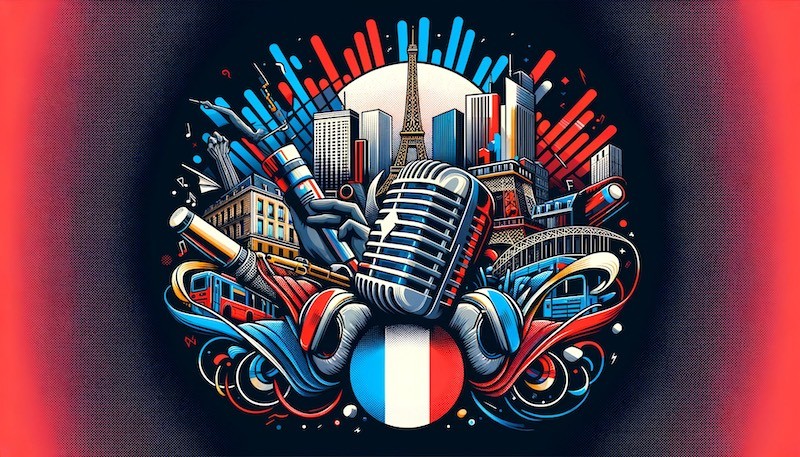
In the early 2000s, French rap experienced a surge in popularity with the rise of artists such as Booba, Rohff, and Diam’s. These artists brought a more hardcore and street-oriented sound to the forefront, delving into themes such as gang violence, drug culture, and urban life. Their lyrical content often reflected the harsh realities faced by marginalized communities in France.
Over the years, French rap has continued to evolve and diversify, giving rise to various regional styles and subgenres. From the gritty and confrontational sounds of Marseille’s “rap sale” to the introspective and poetic vibes of Parisian rap, each region has developed its own distinct flavor within the genre.
Today, French rap remains a dominant force in both the French music industry and the international hip-hop scene. Artists like PNL, Nekfeu, and Orelsan have achieved unprecedented success, blending catchy hooks, thought-provoking lyrics, and innovative production techniques to captivate audiences around the world.
The origins and evolution of French rap demonstrate how the genre has evolved from its early days as a reflection of American hip-hop to a distinct and influential force in its own right. French rap continues to push boundaries, challenge societal norms, and provide a platform for artists to share their stories, making it an integral part of contemporary music and culture in France.
Influential French Rap Artists and Groups: Shaping a Genre
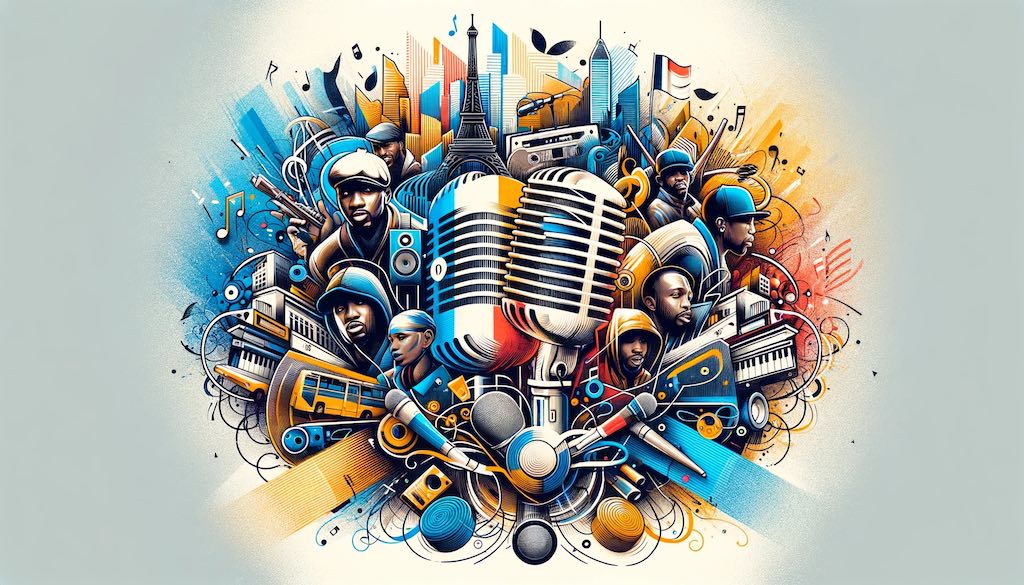
French rap’s landscape has been significantly shaped by a variety of artists and groups, each contributing their distinct style and profound messages to the genre. These talents have not only molded the French rap scene but also influenced mainstream music and culture within France and internationally.
IAM, originating from Marseille in the late 1980s, is a pioneering group known for socially aware lyrics and a unique fusion of musical styles like jazz and funk. Their 1991 debut album, “De la Planète Mars,” introduced a new perspective to French rap, paving the way for future artists.
MC Solaar, often revered as the Godfather of French rap, combines poetic flair with engaging beats. His 1991 debut, “Qui sème le vent récolte le tempo,” showcased his lyrical prowess and earned him international recognition, establishing him as a leading figure in the genre.
The late 1990s saw the emergence of groups like NTM (Suprême NTM) and Sniper, infusing the scene with raw energy and sharp political commentary. NTM, composed of JoeyStarr and Kool Shen, tackled themes such as racism, social inequality, and police brutality in their 1998 album “Suprême NTM.” Sniper, known for their controversial and confrontational lyrics, addressed immigration, urban violence, and political corruption in their 2001 debut, “Du rire aux larmes.” Despite controversies, Sniper resonated with listeners who felt marginalized or overlooked in French society.
The evolution of French rap continued with new artists like Orelsan, Booba, and Nekfeu gaining immense popularity. Their introspective lyrics, catchy hooks, and cutting-edge production have added diversity and innovation to the genre. Each artist has introduced their unique style, pushing the boundaries of French rap and captivating audiences globally.
These influential French rap artists and groups have played a crucial role in the evolution of the genre, leaving an indelible mark with their thought-provoking lyrics and innovative sounds. Their contributions have not only shaped French rap but also profoundly impacted mainstream music and culture, making French rap a vital part of the global hip-hop landscape.
The Impact of French Hip Hop on Mainstream Music and Culture
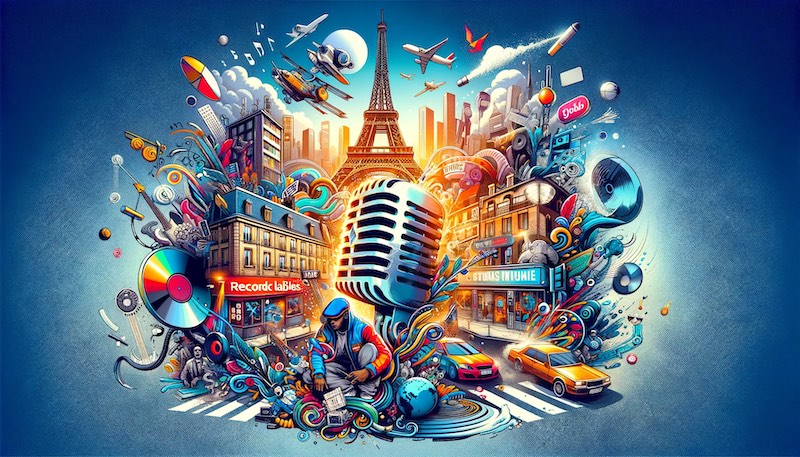
French rap, or “le rap français,” has had a profound impact on mainstream music and culture both in France and around the world. With its unique blend of lyrical storytelling, musical innovation, and social commentary, French rap has managed to carve out its own distinctive space in the global hip-hop landscape.
One of the key reasons for the widespread influence of French rap is its ability to address social and political issues in a way that resonates with audiences. French rap artists often use their lyrics as a means of expressing their frustration with societal inequalities, discrimination, and other forms of injustice. This has made French rap an important platform for marginalized communities to voice their concerns and demand change.
Moreover, French rap has been instrumental in challenging the traditional hierarchy of the French music industry. In the past, French music was dominated by genres such as chanson and pop, which catered to a predominantly white, middle-class audience. French rap, however, broke through these barriers and introduced a new generation of artists from diverse backgrounds and experiences. This not only diversified the French music scene but also paved the way for other non-traditional genres to emerge.
French rap has also played a significant role in shaping popular culture in France. Its influence can be seen in fashion, language, and even the attitudes of young people. French rap artists have often been trendsetters when it comes to fashion, with their unique style and wardrobe choices inspiring fashion designers and clothing brands. Additionally, French rap slang and phrases have seeped into everyday language, becoming part of the contemporary vernacular.
Furthermore, French rap has gained international recognition, with artists such as MC Solaar, IAM, and Booba achieving success beyond the borders of France. The global appeal of French rap has not only opened doors for French artists to collaborate with international stars but has also exposed people from different cultures to the unique sounds and perspectives of French rap.
French rap has had a profound impact on mainstream music and culture. Through its powerful lyrics, social commentary, and musical innovation, French rap has managed to challenge the status quo, diversify the music industry, and become a global cultural phenomenon. Its influence can be felt not only in the music itself but also in other aspects of popular culture, making French rap an important and influential force in today’s world.
The Regional Styles and Subgenres of French Rap
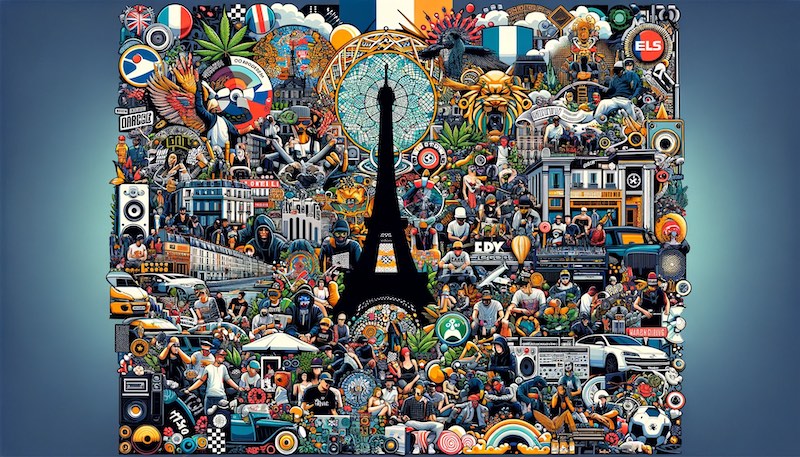
When it comes to French rap, the genre encompasses a wide range of regional styles and subgenres that have evolved over the years. Each region in France has its unique rap style and subculture, contributing to the diversity and richness of French rap music.
One of the prominent regional styles of French rap is “Marseillais rap” or “Marseille rap.” Originating from the city of Marseille in Southern France, this subgenre emerged in the late 1980s and early 1990s. Marseillais rap is characterized by its gritty and intense lyrics, reflecting the city’s social and cultural issues. Artists such as IAM and Fonky Family rose to prominence through their contributions to this subgenre.
Moving to the west of France, we encounter “Nantais rap” or “Nantes rap.” Nantes, a city in the Pays de la Loire region, has its distinctive rap scene. Artists like Orelsan, who achieved mainstream success with his album “Perdu d’avance,” have emerged from this subgenre. Nantais rap often delves into personal stories, social observations, and introspective themes.
In contrast, “Parisian rap” is arguably the most influential and widely recognized subgenre of French rap. Artists such as Booba, Nekfeu, and PNL have dominated the Parisian rap scene and garnered international fame. Parisian rap is known for its slick production, poetic lyricism, and versatile styles that range from hardcore rap to melodic trap-infused beats.
Another notable subgenre is “Strasbourg rap” or “Stras rap,” originating from the northeastern city of Strasbourg. Artists like OZ, 3010, and Lacraps have contributed to this subgenre, which often combines introspective lyrics with a mix of boom-bap and trap beats. Strasbourg rap encompasses a wide range of themes, including social issues, personal experiences, and political commentary.
Additionally, “Toulousain rap” or “Toulouse rap” represents the rap scene in Toulouse, a city located in southwestern France. Artists such as Bigflo & Oli, who gained immense popularity with their album “La Vraie Vie,” are considered icons of this subgenre. Toulousain rap often combines catchy melodies, witty wordplay, and storytelling, making it accessible to a broader audience.
It is important to note that these regional styles and subgenres of French rap are not exclusive or isolated from one another. Artists often collaborate and draw inspiration from multiple subgenres, leading to the fusion of styles and the emergence of new sounds within French rap.
French rap is a diverse and dynamic genre that encompasses a range of regional styles and subgenres. From the gritty Marseillais rap to the slick Parisian rap, each subgenre offers a unique perspective and musical expression. This rich tapestry of regional styles contributes to the cultural significance and lasting impact of French rap on the global music scene.
Social and Political Commentary in French Rap Lyrics
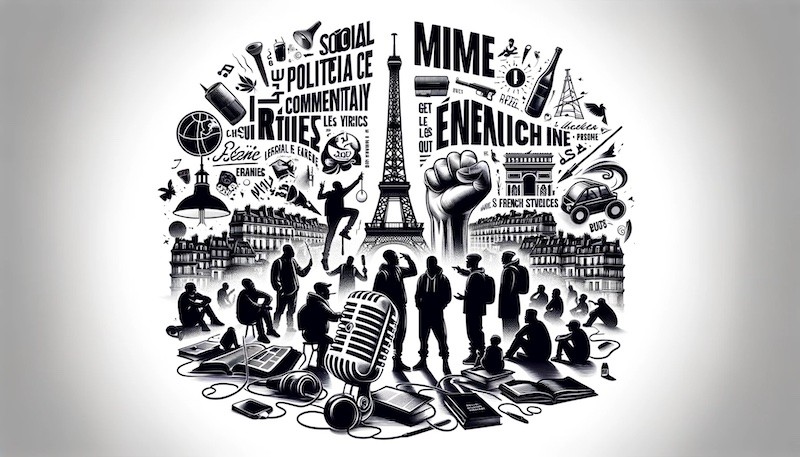
French rap is recognized for addressing social and political issues with its thought-provoking lyrics, standing apart from many other music genres. This style has consistently incorporated socio-political commentary, making it an influential tool for voicing discontent and sparking important conversations.
Artists like NTM, IAM, and Assassin are known for their direct lyrics that confront issues like racism, poverty, discrimination, and police brutality. They use their music to amplify the voices of the marginalized and oppressed, highlighting societal inequalities and advocating for change.
The genre also delves into political commentary, critiquing the government and national state. Rappers such as Kery James, Médine, and La Rumeur are recognized for their politically charged lyrics that challenge the status quo and demand greater accountability from those in power. Their music questions political actions and decisions, sparking discussions about democracy, corruption, and governance.
French rap lyrics are often raw and unfiltered, mirroring the artists’ real-life experiences. They offer insight into the challenges faced within French society, often overlooked in mainstream narratives. By integrating social and political commentary, French rap gives a platform to voices that might otherwise remain unheard.
Additionally, French rap has significantly influenced public discourse and raised awareness about social and political issues. Its ability to reach a broad audience, including the youth who might be disengaged from traditional politics, is notable. Through their lyrics, French rap artists encourage listeners to question societal norms and engage in critical thinking.
In essence, French rap stands out for its effective integration of social and political commentary. By addressing complex issues like racism, poverty, discrimination, and political corruption, French rap artists have profoundly impacted mainstream music and culture. Their lyrics not only draw attention to crucial social and political issues but also inspire listeners to pursue a more just and equitable society.
Listen to our selection on Spotify
36 French Rap Essentials
1. Dee Nasty (1982) A pioneer of French rap, Dee Nasty is a DJ and rapper who paved the way for the rap movement in France.
2. IAM (1989): The group IAM is renowned for its intellectual lyrics and social commitment, becoming a reference for conscious rap.
3. Kool Shen (1989): Kool Shen, a member of NTM, is a pillar of French rap, known for his stage performances and commitment.
4. MC Solaar (1990): MC Solaar is renowned for his poetic rhymes and unique style, captivating a wide audience with memorable hits.
5. NTM (1990): Supreme NTM, with JoeyStarr and Kool Shen, has marked the history of French rap with its energetic performances.
6. Akhenaton (1991): Akhenaton, a member of IAM, is recognized for his profound lyrics and his role in the rise of French rap.
7. Doc Gynéco (1991): Doc Gynéco brought a touch of lightness to French rap while addressing social issues.
8. MC Jean Gab’1 (1991): MC Jean Gab’1, a versatile rapper, is known for his sharp lyrics and artistic commitment.
9. Stomy Bugsy (1991): Stomy Bugsy, a member of the collective Ministère A.M.E.R., contributed to the rise of hardcore rap in France.
10. Lunatic (1992): The duo Lunatic, consisting of Booba and Ali, is renowned for its raw lyrics and its impact on French rap.
11. Expression Direkt (1992): Expression Direkt brought a conscious dimension to French rap with militant lyrics.
12. Psy4 de la Rime (1994): Psy4 de la Rime is known for its melodic and positive rap, conveying messages of hope.
13. Rohff (1994): Rohff is famous for his impactful lyrics and his role in the development of hardcore rap in France.
14. IAM (1995): IAM, an emblematic group, marked French rap with its complex lyricism and notable collaborations.
15. La Cliqua (1995): La Cliqua contributed to the rise of independent rap in France with committed lyrics.
16. Soprano (1996): Soprano is appreciated for his positive rap and inspiring lyrics, addressing themes of resilience.
17. MC Solaar (1997): MC Solaar is a master of words, skillfully combining poetry and hip-hop in his songs.
18. Kery James (1998): Kery James is recognized for his conscious rap and his stances on social issues.
19. Oxmo Puccino (1998): Oxmo Puccino is appreciated for his urban poetry and unique style.
20. La Fouine (2003): La Fouine made a splash with his melodic rap and autobiographical lyrics.
21. Booba (2004): Booba is a heavyweight in French rap, famous for his impactful rhymes and stage presence.
22. Diam’s (2004): Diam’s is a committed artist, known for her feminist rap and profound reflections.
23. Orelsan (2009): Orelsan is a skilled lyricist who revolutionized French rap with his offbeat style.
24. Lomepal (2010): Lomepal is a versatile artist, blending rap with other musical influences, and stands out for his creativity.
25. Nekfeu (2011): Nekfeu is a versatile artist, mastering rap and other genres, with introspective lyrics.
26. PNL (2015): PNL is famous for its atmospheric rap and cinematic videos.
27. Vald (2016): Vald created a buzz with his experimental rap and unconventional lyrics.
28. Ninho (2016): Ninho is a versatile rapper, known for his varied flows and commercial success.
29. Jul (2017): Jul dominated the charts with his productivity and catchy songs.
30. SCH (2018): SCH is recognized for his dark and introspective rap, exploring profound themes.
31. Hamza (2018): Hamza fuses rap with other genres to create an innovative and catchy sound.
32. Niska (2019): Niska is a master of trap rap, carrying a distinctive style and catchy rhythms.
33. Laylow (2020): Laylow stands out for his experimental rap and storytelling.
34. Gazo (2021): Gazo, an emerging artist, brings new energy to French rap with his dynamic flows.
35. Naps (2022): Naps captivates with his melodic rap and sincere lyrics.
36. Tiakola (2022): Tiakola is a young talent exploring new sounds in French rap.
The Resonance and Future of French Rap
As we reflect on the journey and impact of French rap, it becomes evident that this genre is not just a musical style, but a powerful cultural force. French rap has evolved from mirroring its American counterpart to establishing its unique identity, marked by its unapologetic confrontation of social and political issues. The genre’s history, from the pioneering works of IAM and MC Solaar to the raw and impactful contributions of NTM and Sniper, demonstrates a consistent commitment to authenticity and relevance.
French rap artists, by addressing issues like racism, poverty, and political unrest, have created more than just music; they’ve provided a voice for the voiceless and a platform for social commentary. Their lyrics, infused with real-life experiences and societal observations, have not only resonated with marginalized communities but have also drawn attention from a broader audience. This has led to French rap being a significant player in shaping public discourse and influencing mainstream culture.
The diversity of the genre, with its regional styles from Marseille to Paris, reflects the multifaceted nature of French society itself. Each regional style, whether it be the gritty narratives of Marseille or the introspective beats of Paris, contributes to the rich tapestry of French rap. This diversity is not only a testament to the genre’s adaptability but also to its inclusivity, accommodating a wide range of experiences and perspectives.
Looking at the contemporary scene, artists like Orelsan, Booba, and Nekfeu have taken French rap to new heights, blending innovative production with introspective lyrics. Their success signifies the genre’s ongoing evolution and its ability to stay relevant in a rapidly changing world. These artists, along with many others, have ensured that French rap remains at the forefront of not just the French music scene but the global hip-hop landscape.
The global influence of French rap is undeniable. With its artists gaining international recognition, the genre has transcended linguistic barriers, attracting listeners and collaborators worldwide. This international appeal is a testament to the universal power of music as a medium for storytelling and cultural expression. French rap’s ability to connect with people across different cultures and backgrounds highlights its role as a global ambassador for French culture and creativity.
As we look to the future, French rap continues to be a dynamic and influential genre. With its roots firmly planted in social consciousness and its branches reaching towards global appeal, French rap is poised to continue its legacy. The genre’s commitment to addressing pressing social and political issues ensures its relevance in a world where art and activism often intersect. The ongoing evolution of French rap, both in terms of style and substance, suggests that it will continue to be a vital, vibrant, and voice-driven force in the world of music.
French rap is more than a genre; it’s a cultural phenomenon that has significantly influenced music, society, and politics. Its unique blend of powerful lyrics, diverse styles, and social commentary continues to captivate and inspire audiences around the world. As French rap artists continue to innovate and express, they carry with them a legacy of impact and a future of endless possibilities.

